The wind whips over frozen puddles in the gutter and heaps of road grit. I’m stood outside a mobile phone repair shop with two other people in Hamburg-Eppendorf who, like me, have been foolish enough to try and take a photo with an important electronic device in the sub-zero conditions over Christmas. Monday 27th December 2021, 10am: the shop opens.
Well, it doesn’t really open. The lights go on and the shopkeeper comes to the door, unlocks it, and barks at us to put our masks on. “Impfnachweis!” he shouts at the first person in the queue before, having inspected their proof of vaccination with the demeanour of an Afghanistan-hardened army medic, reluctantly letting him in – and then slamming the door in the face of the second person in the queue and locking it shut again.
How could we have been naïve enough to think that we might be able to get out of the freezing cold and perhaps even avail ourselves of one of the two armchairs placed several yards away from the counter and its Perspex screen…? So we wait outside, now more nervous about not being admitted to shelter before hypothermia sets in than about how much the repair will cost. At least, I think to myself, I had the foresight to get my vaccination QR code in non-electronic credit-card format.
Increasingly difficult rules
That was life in Germany in late 2021. And life in Germany in early 2022 is about to get even worse – as of this weekend actually, when “2G-plus” will become the latest nationwide requirement for doing all sorts of things. Precisely what will, as ever, depend on factors varying from which of the 16 federal states you’re in (plucky Saxony-Anhalt, for instance, is sticking to plain 2G in restaurants), how the provider in question interprets the rules, and whether Jupiter is in the ascendancy. Goodie-two-shoes Hamburg has, true fo form, already enacted everything early.
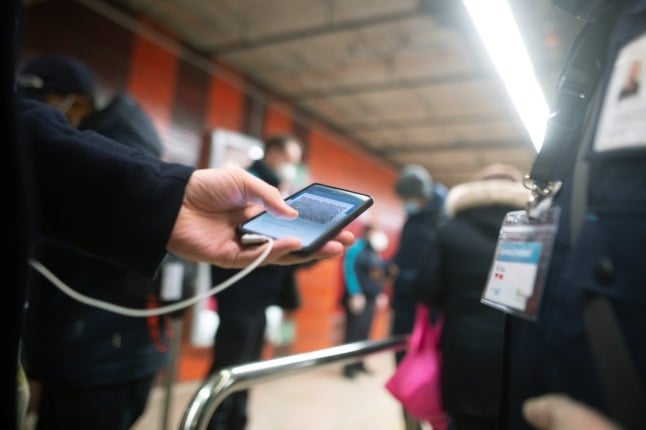
Essentially, to access restaurants and bars, as well as most other public venues except essential retail (however that is defined), those who have yet to get the booster jab or to recover from an infection with SARS-CoV2 within the last six months following a full course of vaccination will need to have a negative result from a lateral flow test taken no more than 24 hours (or a PCR test taken no less than 48 hours) previously; unless, of course… (cont. p94).
And so German officials’ valiant yet increasingly vain attempts to control the spread of coronavirus from behind their desks continue with ever more complicated rules which, while very much in tune with the minutiae of the latest virology research papers and checked by Legal to be 100 percent watertight, are becoming increasingly difficult to navigate for anyone who isn’t called Karl Lauterbach.
READ ALSO: What we know so far about Germany’s 2G-plus rules for restaurants
It would be unfair to single Germany out here: at some point in this pandemic, almost every European country has been subject to restrictions which were complex – and in some cases contradictory enough to trip even the most compliant. Friends in Spain tell me that, for a while, it was illegal to get a lift to work with another member of your own household in a jointly-owned car. And Boris Johnson was clearly baffled by the UK Governm… Okay, maybe not the best example. But you see my point.
A couple of particularly German traits, however, are making our current situation unbearable. Firstly, there’s our well-known tendency to take even overly-complex or patently pointless rules – and their application – very seriously. Secondly, our long-abeyant inability to moderate our tone and show kindness has resurfaced, quite unexpectedly and quite virulently.
From traffic lights to… everything
Let’s take excessive respect for rules first. In those halcyon pre-2020 days, the most visible instance of this was people stood in the dead of night waiting minutes on end for the little green man at the traffic lights while tumbleweeds rolled along the road. Now, waiters and waitresses, mobile-phone repair shop employees, and (of course!) Bademeister (lifeguards) all feel our national urge to comply – and indeed, if in doubt – over-comply with whatever the current busybody regulations are.
Take restaurants in Hamburg: many seem to think that it is a legal requirement that you check in using the dreaded Luca app (it isn’t), employ security staff to force you to pointlessly disinfect your hands (it’s month 20, guys, come on!), and enforce FFP2 mask-wearing even when you’re just going for a leak and the place is half empty.
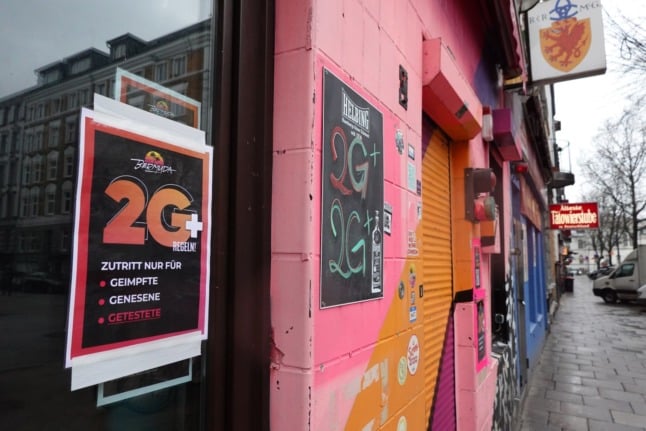
You can’t blame the landlords, I guess: in a city whose mayor is a laboratory doctor by profession and in a country with some of the strictest Covid regulations on the continent, you might as well assume the worst. The cumulative effect, however, feels like a return to the worst days of post-war German gastronomy, when café owners would impose all sorts of rules on their long-suffering customers, the most notorious of which was “Draußen nur Kännchen!” – a petty refusal to serve single cups of coffee on outdoor tables which became an ironic catchphrase.
READ ALSO: What people who’ve had the J&J jab in Germany need to know
Rudeness returns
Maybe our national love of excessive compliance – affectionately referred to as Kadavergehorsam (literally “corpse obedience”) – wouldn’t grate as much if it weren’t for the violent resurgence of another clichéd German characteristic: bone-headed rudeness. It’s such a shame, because even within the short space of my lifetime, Germany had made strides here.
Where it had once been common for police officers to growl “Ausweis her!” to see your ID, and for train guards to bark orders at passengers, by the late 2010s, Germany had reached a relaxed, friendly public tone – direct at times, blunt even like in the Netherlands (or the north of England), but warm-hearted nevertheless. Now, a shouty “Halt! Hände desinfizieren!” (disinfect your hands) or a curt “Maske!” with a long E are the new refrains of a country once again strikingly ill-at-ease with itself. Other Germans are upset about this too, but we all just can’t seem to help ourselves whenever we are the ones exercising authority.
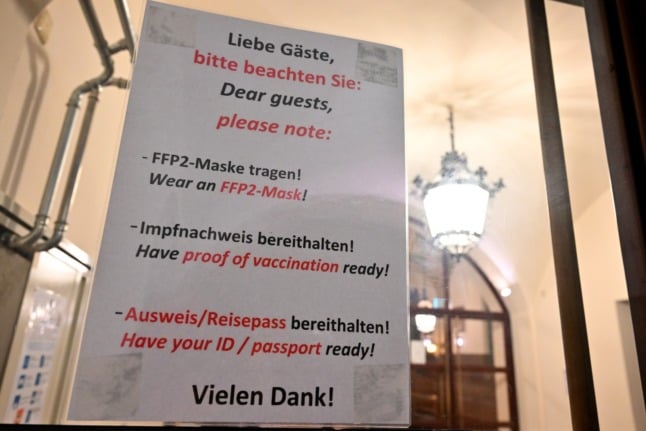
Without getting into the issue of whether vaccine passports are a suitable or proportionate long-term policy tool in the public health kit (and now that even the vaccinated are having to get tests, you could be forgiven for having your doubts), I’d like to close by making a simple suggestion: if people checking certifications were friendly and exercised some minor discretion from time to time, we could make everyone feel a lot better very quickly.
After all, for the unfortunate among us whose Covid immunity is predicated on anything more complicated than the standard three jabs, it could be a long and very cold winter. Especially if they happen to have a broken phone and their certificate is in the CovPass app.

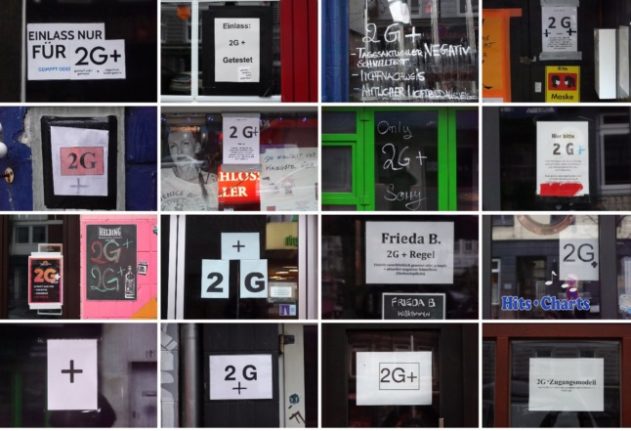


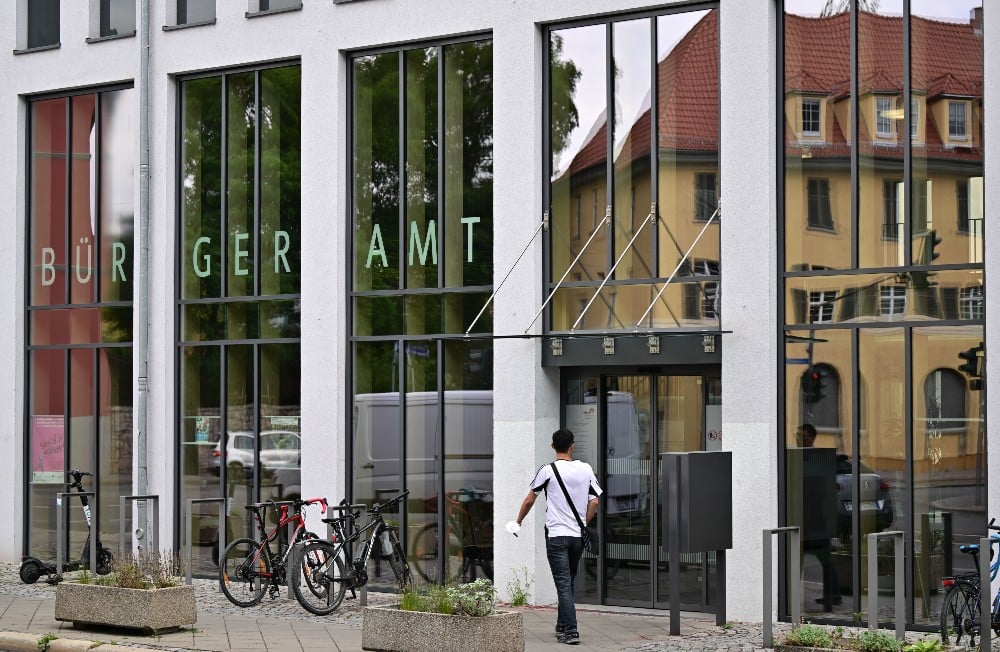
 Please whitelist us to continue reading.
Please whitelist us to continue reading.
If your phone is broken – print the pass.
Mask up, vaccinate, and stop whining.
Is that sarcastic?
Absolutely not.
Do you know. I still can’t tell.
Yeah.
The author did have a printed pass, and didn’t say anything negative or “whiny” about either masks or vaccination.
According to the author disinfecting hands is pointless and so is wearing a mask when standing up from a table at a restaurant. He also mentions doubts about vaccination after 2G+ is introduced. He also whines on behalf of people with a broken phone and their pass only existing on the said phone.
I assume you were replying to me. My screen has messed up and me last post was apparently my first. So I don’t know.
With regards to mask wearing and hand disinfectant. I have done training in areas of chemical protection. (I’m not an expert by any means.) But what we do here. Using a disposal mask more than once. A quick squirt of alcohol gel. Doesnt do anything. Sorry. It just doesn’t. Its very complicated to keep sterile.
A quick example: in oder to take off your mask. You should
1. de contaminate your hands and the areas you may touch of your mask and face.
2. Remove mask and place directly in a bio hazard bag for the incinerator.
3. Clean your hands again not touching the area you used in stage 1. As that area is considered dirty.
That is the simple version.
The 2G+ is just a move. Double vaxxed without a booster will be the same as unvaxxed soon. 1 booster will need a test and 2 boosters will not. Six months later only 3 bolstered won’t need a test.
I refuse to show my medical status to anyone other than my doctor, my health provider and myself. I find it abhorrent. I think everyone should do the same. In a matter of days health passports would be gone. But we won’t so they will grow into a grotesque monster.
You are committing an obvious logical fallacy here – overcomplicate the rules until they are impossible to follow and then refuse to follow them, because they are too complicated. In reality personal protection isn’t all or nothing – changing masks occasionally and using some disinfectant is still way better than doing nothing. However I actually change masks daily (and so do most of the people I know) – and I do disinfect my hands thoroughly.
As COVID-19 is a rapidly evolving virus, so vaccine requirements will evolve over time. This is nothing unexpected or new – unless you are intentionally refusing to look at the science (or even at the flu). At some point we will have vaccine version 2, which will not require previous shots – but we are not there yet, sadly.
All the ranting about ‘medical status’… just say you are unvaccinated. No vaccinated person has a problem with it. You always had to prove yours vaccinations to go somewhere tropical, or to enrol children in schools, etc – it’s not an issue.
I dont think I’ve over complicated the rules. They are very simple rules. But pointless. We’ve had about 18 months of mandatory face masks. The numbers have gone up and down in that time, evidence that they actually work is flimsy at best. The science says they stop at the very best 10% of infections at the worse they may even increase infection because, incorrectly wearing them and false confidence.
Then the health minister goes and changes what masks you need. To the most expensive ones are the only acceptable ones. I wonder. Kick backs or science?
Sometimes doing nothing is the best course of action. Look at England doing nothing and Wales and Scotland trying to emulate China. England has the lowest infection rates of the 3.
I ranted about medical status because I find that “othering” members of society is despicable. Also, very reminiscent of 1930’s Germany. We are walking a knife edge we will do very well to remember that. Everywhere I have traveled .I’ve not once been asked to show my vaccine status at entry.
Kids in Germany have only recently been required to have MMR (i only know kindergarten rules).
Im against that also. Each parent should do what they believe is right for their kids.
Over the years vaccines have done amazing things.( i recently read an article how they may have found a way to make a vaccine to prevent AIDS. Now thats amazing for countries where thats rampant.)
But I also believe in freedom to choose. Are people going to make the wrong choices? Of course there are. But they were free to choose.
I have seen vaccinated people looking around to make sure people see that they are showing a pass and asking who they can show it to. I’ve also seen people asking why they even need to show it at all. I guess it really depends on what people are willing to disclose to the public.
You assume im unvaccinated, thats fine. Believe what you want. I will never ask you your status because truthfully. I dont care. I’d still have a beer with you.
I’m not sure, actually, that he is unvaccinated… and I agree with him on the point. I don’t care what people’s status is either. The rule is in our house, if you want to come in the house, take a test. Period. That said, needing a vaccination to go to some place tropical, etc is different than THIS vaccination. The previous vaccines have been fully tested, fully vetted, including longterm. This one has not.
“The rule is in our house, if you want to come in the house, take a test. Period. ”
I like that. You are taking the precautions you feel are necessary in your personal life. Thats what’s been needed this whole time. Personal responsibility. I dont agree with it and would operate differently. But your house your rules. I would follow that out of respect for friends.
Thats how I think this whole pandemic should have been dealt with from the start.
Previous vaccines are tested albeit with terrible side effects. This one uses all the things we learned and that knowledge application to make this as safe as it gets. No other vaccine in history has been used and applied as much as this so it has been tested in effect more than all the others you refer to.
I tried to reply
There’s two things I cannot tolerate and will not accept. The first is impatient Germans driving up my ass and the second is being barked at… by anyone. Both get the finger
Just remember that giving someone the finger while driving carries an unlimited fine. That is based upon the person complaining perceived offence. (Does not have to be the person that you swear at).
Anyone who’s rude to me. I just speak English back. Once they calm down speak German again.
(Its great fun at times). I can’t stand people who are intentionally rude.
Yes I’ve been yelled at a few times for leaving the table to grab some salt (barely 10 feet) some how there is a protective force field around my table that disappears the moment my butt leaves the chair!
Because when you sit at your table, your breathing rate is lower and in a semi-contained location. When you stand up and walk – you are potentially spreading the virus along the way, while also breathing faster due to the movement. You’d think after nearly 2 years of the pandemic you would understand this.
I can’t tell if you are being serious or sarcastic. But we’ve known since very early days in the pandemic it’s all about ventilation. As one person put it it’s like smoke, Open the windows and vent light the room.
Two years and I’m noticing Warren more staff removing mask as I get tired of wearing them all day.
Typo, as they get tired of wearing them all day
If the author so unhappy about the rule-following, I invite them to board a train and spend a weekend in Poland or Czech Republic. The passengers (who are less than 50% likely to be vaccinated at all) will take off their masks as soon as the border is crossed. Upon arrival – there are no cov pass checks – one can go to a packed cinema, no masks, tests or vaccination status required. In closed, crowded spaces such as shopping malls, one can observe a full menu of options – no mask, a mask under the nose, under the chin, a bandana or scarf covering the face etc. No one will be admonished for being a covidiot and not wearing their mask. Lovely, rule free environment. The death rate is only 2.5 times higher, so a small price to pay.
India, Bangladesh, and Pakistan all have death rates lower than Germany. Tell me again how accurate that data is.
You are right – I only quoted the official data in my argument but Poland and CR probably have much higher covid death rate, but are reporting fewer of those because of less testing and tendency to report deaths as other than covid if there were comorbidities. So the situation in the rule free paradise of the east is even more dire. Thank you for helping me to make my point.
I would argue the higher death rate IS worth it. I visited the US in October and I felt like a free human again. I’m vaccinated, so I’m not worried about myself and I don’t really care what happens to those who decide not to get vaccinated. The new virus is going is going around my office and many are testing positive. Most are home few days with symptoms and then they’re fine. I’m done with it all. The masks, the passes, etc. I even vaccinated my kids. Now they want them boostered. For what? They’ll be fine. To prevent infection? It seems not to matter. Poor kids still have 3 tests a week at school and masks ALL damn day. Utterly useless and unscientific. Frankly, I took a massive pay cut to come work in Germany and I thought it might be worth it so they could experience something different. I’ve since learned this place is not superior, not more cultured, and not more free. My standard of living has been lowered. As soon as my contract is up, I think we’re headed back to the USA.
Thats exactly how I feel. Im sorry you’re having a bad experience here in Germany. But you are right it definitely doesn’t feel free here anymore.
The personal freedom of choice seams to be more and more theoretical in Germany :/…
IT used to be so great to be here, work hard, play hard kind of thing, very fulfilling and a lot of fun.
IT seams that that’s more and more gone now.
Would be so great to go to Florida if I were an USA citizen…
Florida is nice. It’s ranked the freest of all the US states and it’s the state I happen to be a resident of, well, until I came here anyways.
Same
Don’t forget to wash your socks regularly. Any unwanted socks should be labelled, quarantined then burnt.
I’m following this far more closely than I really should and, especially in the US, the messaging around the pandemic has been absolutely criminal! Unbelievably bad.
But what my real concern is that the pandemic will end (we’re at the tail end now) But the restrictions never will the vaccine passports won’t go away the test to travel requirements won’t go away etc. etc.
This is a CORONAVIRUS and by its very nature will mutate and evolve and unfortunately this is not going to end. Coronavirus by nature are from animals infecting humans to be simple… and each one is progressing and not to our benefit
I retired to Florida three years ago after living in Germany for 25 years. So I’m very familiar with the Germany’s obessesion for compliance/uniformity.
I’m flying from Florida to Germany this weekend to visit my children/grandchildren. If I didn’t have family there, I wouldn’t go at all. Even though I’m vaxxed + boosted, I must quarantine for 10 days upon arrival (5 days only if I present a negative PCR) before I can leave my residence and circulate among the living. How about a test upon arrival and bypass the quarantine? No it’s not good enough and just gets stupid with these mindless protocols.
For an example, require people wear a mask entering a restaurant, and then take it off to eat your food, like the virus wont’ infect you while sitting at the table. Unscientific and pure theater.
So much of it has to do with power and control. The virus has given the government unprecedented authority to lockdown people in their homes, shutdown businesses and restrict travel in the name of “public safety”. Give someone power and it often emboldens them to want more. And even harder to let go.